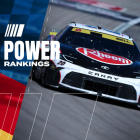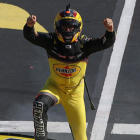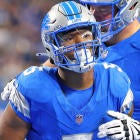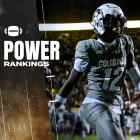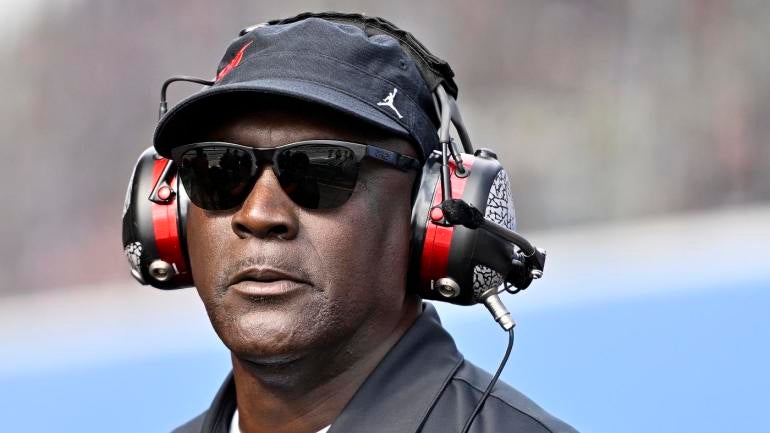
23XI Racing and Front Row Motorsports have filed a federal antitrust lawsuit against NASCAR over a dispute in the terms of the sport's new revenue sharing agreement, accusing the sanctioning body and CEO Jim France of using "anticompetitive and exclusionary practices" in order to enrich themselves at the expense of their race teams. The litigation comes after 23XI Racing, co-owned by NBA icon Michael Jordan, and Front Row Motorsports were the lone two teams to refuse to agree to a renewal of the sport's charter system a month ago. The two teams released a joint statement on the lawsuit on Wednesday.
"The France family and NASCAR are monopolistic bullies," read a copy of the lawsuit obtained by CBS Sports. "And bullies will continue to impose their will to hurt others until their targets stand up and refuse to be victims. That moment has now arrived."
After contentious negotiations throughout the year on a renewal to NASCAR's charter agreement -- the sport's equivalent of a franchising model -- it was reported that 13 out of NASCAR's 15 chartered teams signed the charter agreement prior to last month's race at Atlanta Motor Speedway, under threat that they would lose their charters and have their multi-million dollar investments become worthless if they did not comply with a midnight deadline. The only two holdouts were Front Row Motorsports and 23XI Racing, with the latter putting out a statement claiming that it did not have "an opportunity to fairly bargain for a new Charter contract."
According to Fox Sports, while teams are set to receive a greater portion of revenue from NASCAR's new $7.7 billion media rights deal that runs through 2031, they also gave up rights that could potentially generate revenue for them including ancillary media rights, driver appearance requirements and a cut of charter sales. The teams had also been pushing for charters to become permanent as opposed to tied to the media rights deal, an idea which NASCAR -- under the leadership of Jim France -- opposed.
23XI and Front Row have hired top antitrust lawyer Jeffrey Kessler, whose claims to fame include litigations for current free agency rules in the NFL and NBA as well as NIL deals for college football players. Kessler had been advising NASCAR's teams in their negotiations with the sanctioning body after they declined to extend their exclusive negotiating window prior to this year's Daytona 500.
Statement from 23XI and Front Row Motorsports ownership. Read more here https://t.co/zvseR0i7bP pic.twitter.com/2HGtyawX6k
— 23XI Racing (@23XIRacing) October 2, 2024
The teams will seek treble damages for anti-competitive terms that have been in place since the introduction of NASCAR's charter system in 2016, citing the sport's purchase of a large cache of racetracks it competes on, the control NASCAR's Next Gen car platform gives them to make teams buy car parts from its approved vendors, its acquisition of the ARCA Menards Series -- a developmental stock car league that has traditionally served as a junior circuit to NASCAR -- and its use of covenants to keep team owners from competing in any other stock car racing series.
"By continuously employing anticompetitive restrictions on racetrack access, restrictions on teams competing in other events, and other anticompetitive acts, NASCAR has unlawfully maintained its monopoly position for offering a top-tier stock car racing series in the United States in violation of the Sherman Antitrust Act," read the lawsuit. "No stock car racing team can compete at the top-tier level in the United States without accepting the anticompetitive terms that NASCAR imposes as a condition for the teams to compete in the input market for racing teams that NASCAR controls."
Interestingly, the Associated Press reports that Kessler will seek a preliminary injunction for both 23XI and Front Row to compete as chartered teams in 2025 while litigation proceeds.
For much of its history, NASCAR's drivers and race teams operated as independent contractors, and the sanctioning body itself was notoriously and viciously anti-union. NASCAR founder Bill France famously responded to an attempt by Curtis Turner to form a driver's union in the early 1960s by banning both him and Tim Flock for life (the ban was later overturned), and also responded to an organized driver protest over safety concerns surrounding the inaugural race at Talladega Superspeedway in 1969 by carrying on and filling the race with scabs from the preliminary race.
But as the sport struggled through a decline from the heights of its popularity and its practices remained stagnant with teams depending almost entirely on sponsorship to survive, the Race Team Alliance -- a union-like collection of Cup Series owners -- organized in 2014 to negotiate with NASCAR on major issues, namely a better business model for themselves including a version of a franchising and revenue-sharing model that would give team owners a tangible, monetized asset that could appreciate in value and also be sold, offering owners looking to downsize or shut their teams down far more than simple pennies on the dollar for their spare equipment and major financial losses.
Joint statement from 23XI Racing and Front Row Motorsports. https://t.co/OJiFZh3Ljt pic.twitter.com/eIroHelz9R
— Front Row Motorsports (@Team_FRM) October 2, 2024
Beginning in 2016, NASCAR and its teams agreed to their original charter agreement, with NASCAR allotting 36 charters that would guarantee its full-time teams a spot in every Cup Series race. However, the terms of the agreement only ran through the end of the sport's current media rights deal in 2024, making negotiating a new charter deal and further steps to ensure a sustainable business model a necessity.
Those negotiations became acrimonious, though, with team officials going public in October 2022 to say that they had not made progress in negotiations. In April 2023, team owners reportedly boycotted a meeting with NASCAR over frustrations on negotiations and what they felt was a lack of good faith from the sanctioning body.
As of Wednesday morning, NASCAR has yet to make a public comment on the teams' lawsuit.









